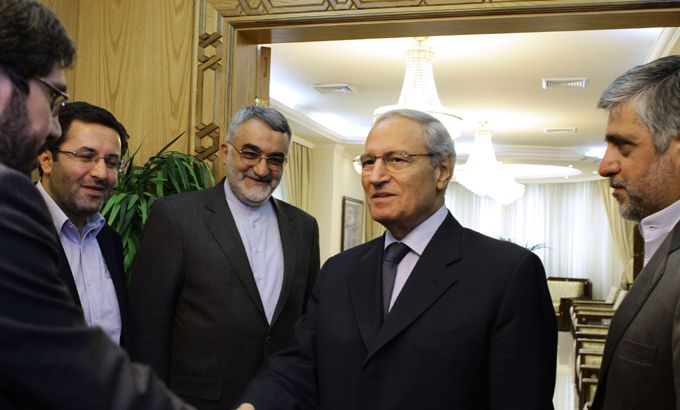Assad VP appears for first time in weeks
Faruq al-Shara makes first public appearance in over a month, following rumours he had tried to defect from government.

Faruq al-Shara, Syria’s vice-president, has made his first public appearance in over a month, following rumours that he had tried to defect and was under house arrest.
Shara, who on Sunday met Aladin Borujerdi, head of the Iranian parliament’s foreign-policy committee, was last seen in public at a state funeral for senior security officials who were killed in a bomb blast in Damascus on July 18.
Speculation has swirled since last week over the fate of Shara, the most powerful Sunni Muslim figure in President Bashar al-Assad’s minority Alawite-led government, since the opposition claimed he had tried to defect.
Assad’s government has been hit by several defections as the Syrian conflict has escalated, including former prime minister Riad Hijab and prominent General Manaf Tlass, one of Assad’s childhood friends.
The July 18 bomb attack claimed by the Free Syrian Army also dealt him a major blow, killling four high-level security officials including the defence minister, Daoud Rajha, and his deputy, Assef Shawkat, Assad’s brother-in-law.
Defection speculation
After the opposition claims that the 73-year-old Shara had defected, state television on August 19 quoted a statement from his office saying: “Mr Shara has never thought about leaving the country or going anywhere.”
A former deputy oil minister who defected in March this year also said earlier this month that it was “well-known” that Shara had tried to leave the country and was under house arrest.
Pictures taken by an AFP photographer show Shara, dressed in a dark blue business suit and wearing glasses, holding talks with Borujerdi at his office in Damascus.
Borujerdi, whose government is Syria’s staunchest ally, was quoted by the state news agency IRNA as saying: “We see Syria’s security as our security. On this basis, we will stick by our Syrian brothers.”
Assad, who also met the Iranian delegation in Damascus on Sunday, said the Syrian crisis was the result of Western and regional states trying to crush its role in the “resistance” against Western and Israeli domination in the region.
“What is happening right now is not just a plot directed against Syria but the region as a whole, of which Syria is a foundational stone,” he was cited as saying by state news agency SANA.
Walid Muallem, Assad’s foreign minister, said the Syrian government would only look at negotiating with the opposition after “purging Syria of armed groups”, IRNA reported.
Claim denied
SANA had said on Saturday that a fake email had been sent out in its name claiming that Shara had been sacked, adding that the “information is completely wrong”.
It was also forced to deny that Muallem had announced on Twitter he had replaced Shara, saying the information was “wrong” and that the foreign minister did not have a Twitter account.
Shara, along with several other senior government figures, was hit with sanctions by the US and the EU in May last year, just two months after the start of the uprising against Assad’s rule.
Shara has served in senior posts for almost 30 years under both Assad and his father and predecessor Hafez al-Assad, becoming vice-president in 2006 after serving as foreign minister since 1984.
Hijab, the most prominent political figure to defect, said on August 15 after fleeing to Jordan that the Assad government only controlled 30 per cent of Syria’s territory and had “collapsed militarily, economically and morally”.
Sunday’s developments came as Syrian opposition activists accused the army of massacring hundreds of people in a town close to Damascus that government forces recaptured from rebels.
About 320 bodies, including women and children, were found in houses and basements in the town of Daraya, southwest of Damascus, according to activists who said on Sunday that most had been killed “execution-style” by troops.
Due to restrictions on non-state media in Syria, it was impossible to verify the accounts independently.
Clashes are raging across Syria as the 17-month-old rebellion grows increasingly bloody, particularly in the northern city of Aleppo, where the army and rebels appear stuck in a war of attrition.
Fighting in Aleppo on Sunday was the heaviest in the past week, according to Reuters journalists on the ground.
Fighter jets dropped bombs and fired missiles on rebel-held districts in the south of Aleppo, Syria’s largest city, as residents fled in panic.
Reuters journalists there heard heavy explosions as clouds of black smoke rose a mile into the air.